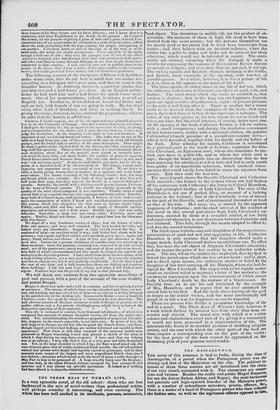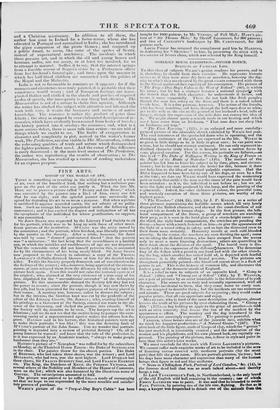THE MASCARENHAS.
THE scene of this romance is laid in India, during the time of Aurungzcbe, at a period when the Portuguese power was de- clining and that of the Mahrattas on the rise. The political in- terests of these three nations are all introduced into the story, if not very closely connected with it. The characters are nume- rous and various. Besides the crafty and politic Mogul Emperor. his son the future Sultan Akbar, and Segavi, the semi-barbarous but patriotic and high-spirited founder of the Maitratta power, with a number of subordinate ministers, priests, officers, 8tct. there is a leader of a band of Portuguese pirates who then infested the Indian seas, as well as the legitimate officers opposed to bur, and a Christian missionary. In addition to all these, the author has gone to Ireland for a foster-nurse, whom she has educated in Portugal and naturalized in India ; site has introduced the gipsy companion of the pirate Gomez ; and conjured up a politic dwarf, to serve, like some of the sprites of Senn, instead of supernatural machinery. The incidents in which these persons act, and in which the old and young heroes and heroines suffer, are too many, or at least too involved, for us to attempt to unravel. Suffice it to say, that the interest springs from a forcible rescue of Segavi's sister by a Portuguese officer from her husband's funeral-pile ; snd turns upon the manner in which her half-blood children are connected with the politics of the Mogul and the Mahratta. India is not so favourable to romance as it appears for if the manners and characters were truly painted, it is probable that their remoteness would weary: and if European feelings are trans- planted thither and clothed in the shreds and patches of acquired modes of speeds, the incongruity is any thing but effective. The 111ascarenhas is not of a nature to shake this opinion. Although the writer has studied the subject with attention and laboured the work with care, it wants the buoyancy and raciness of native knowledge. The romance is rather the product of pains than felicity ; the story is stopped by over-elaborated descriptions of ac- cessories, which have evidently been conned from books of travels; the history poured into it overlays the romance; and, what is a more serious defect, there is more talk titan action—we are told of things which we ought to see. The faults of exaggeration in character and complexity in plot, noticed in the writer's former work, The Prediction, arc also visible in The Muscurenhus, without the redeeming qualities of truth and nature which distinguished the lighter portions of that novel. And the cause of this difference is easily discovered : in the more level scenes of The Prediction, the author was reproducing the results of observation ; its The Mascurenhas, she has worked up a course of reading undertaken for an express purpose.



























 Previous page
Previous page